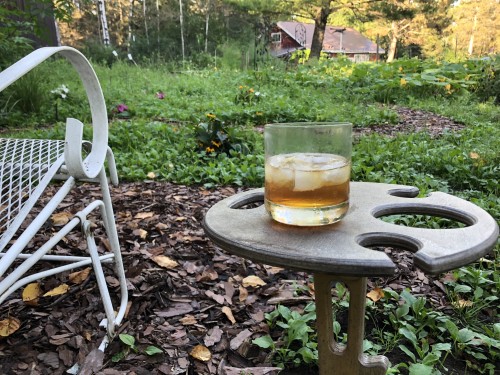Of Manhattans and Chocolate Milk and Gardens and God and Stewarding It All
It is more than possible to hold in harmony Manhattans and chocolate milk and Bach and Aretha and gardens and cityscapes and love of other and of self and the reign of God and sharing them all.
Here’s how.
Imagine the transformations that would occur if we grasped the truth that fundamentally, nothing is ours.
Not one thing.
Not our status not our riches not our homes not our churches not our nation not one single thing is ours.
Moreover, the same is true of others: not their status not their riches not their homes not their churches not their nation not one single thing is theirs.
It’s radical, when you stop and think of it.
That chair you’re sitting in?
Not yours.
That retirement account you’ve got?
Not yours.
That educational title before your name?
Not yours.
That land you have?
Not yours.
Actually, they’re all God’s.
Stick with me here.
You get them for a while, but they’re really God’s, for you to manage and tend to in God’s stead.
That means, among other things, that we aren’t defined by what we have or have not, because nothing is ours anyway.
It’s all God’s.
If anything, we’re defined by our vocation as stewards.
We’re tend-ers.
And it’s not that we’re ‘just’ stewards, ‘just’ tend-ers.
Not ‘merely’ stewards, ‘merely’ tend-ers.
We get to be stewards, we get to be tend-ers.
We get to represent God in the world and for the world and to and within ourselves.
Seriously: think of how that would change how we treat ourselves, and how we treat others, if we truly grasped that news.
Think of how really metabolizing that notion in our very being would change how we treat the land, our waters, our social and political policies, our understandings of personal and institutional hospitality.
It’s all God’s.
This whole ‘mine’ and ‘ours’ pronoun business makes little if any sense, when you theologically get right down to it.
We do with everything—our possessions, our accomplishments, our relationships, and so on and so forth—what God would have us do with them.
We see everything as God would see them.
It’s not about making us great, again or otherwise.
It’s about making the great God all the more manifest in the world by who we are and what we do and say during our days, and about reconsidering, therefore, what it is to be great.
Of course, we still get to put our unique mark on matters.
We have individual flair, and gifts, and interests, and capacities.
In fact, we are all the more invited to delve deeper into who we are and who we understand God to be—key, if we want to represent God by sharing God in all that we are and do.
As for me and my house, we tend to think God loves a good Manhattan—for those who can drink it.
For those who can’t, God loves a mean spritzer with a twist or a homemade chocolate milk.
God loves homegrown carrots and trails woven through the woods.
God loves a good puzzle and fine art and Bach and Amos Lee and let’s be clear: God blesses Aretha and all who hear her.
God loves a simple bouquet picked from the yard, even if it’s adorned with blooms that some malign as a weed.
God loves Broadway.
God loves both a good debate and also peace, and God probably loves the Minnesota Twins more than any other baseball team, but that’s a point that can be quibbled I suppose.
God loves ordinary people, salt-of-the-earth people, artistic people, wise people, witty people, educated people, trained people, storytelling people, humble people, kind people, healthy people, equity between people: in short, God loves it when people are fully who they are most fully made and called to be, and who empower others to be that too.
God loves it when lonely, sad, despairing, sick people are touched by those who know themselves and know to steward God’s love and life.
God loves a vulnerable “I’m sorry,” a “Can we have a do-over, or maybe give that another whirl?” a sheepish and well-deserved “I’m a dolt.”
God loves a grand “Yes you’re a dolt and I forgive you.”
God loves good love.
All of this, all of this, can be stewarded: beverages and nature and pasttimes and beauty and art and interactions and essences and vulnerabilities and extravagant forgiveness and love.
Most of all, of couse, God loves life, and abundant life, for all.
Moreover, God redefines what abundant life is.
It isn’t more or most or all of something.
It’s satisfied, shared, welcoming, humble, joyous life, given for you and for all people, and shared for you and all people too, in the name of God.
Though I wouldn’t suggest that a person drink the Manhattan and the chocolate milk in the same sitting.
God does not love that combo.
Ish.
